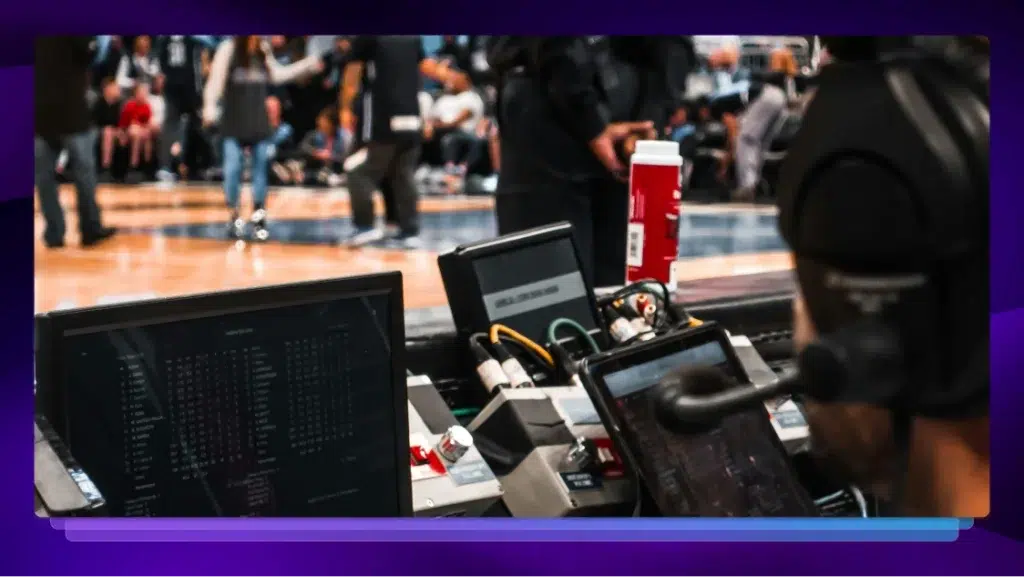Sports Analysis Software: What It Is & 6 Top Picks
Discover the best sports analysis software tools. Learn how to capture, analyze, and improve performance through data-driven insights.

When it comes to sports, every move, decision, and play can be a (literal) game-changer. From team playbooks to individual player performances, reviewing and dissecting play post-game has been — and continues to be — almost as crucial as the game itself.
Many sports are incredibly fast-paced, which makes performing post-game evaluation difficult — even with continuing improvements in video and audio recording technology (as well as sports closed captioning), it’s difficult to catch every moment, every play, and every decision to create the full story. Enter sports analysis software.
What Is Sports Analysis Software?
Sports analytics software is a set of tools that enhance our understanding of (and ability to draw conclusions from) gameplay. It can be anything from assisted video recordings, game summary generators, vitals tracking for players, and much more.
It’s used widely by programs across sports, divisions, and age groups — any coach, trainer, or player who’s looking to continue improving their performance can benefit from sports analysis software.
Our Top Picks for Sports Analysis Software
Looking for the technology that will help you level up your game? We’ve got you covered — here are our top picks (AI-powered and not) for sports analytics software:
1. Hudl Sportscode
Hudl Sportscode is regarded as the industry leader in sports analysis software — it specializes its solutions by the level, age group, and sport to provide the most in-depth and useful information based on video footage and player data. As of April 2021, Hudl Sportscode’s Pro plan also includes access to an AI-powered graphics tool called Studio.
Pricing for Hudl Sportscode ranges fairly widely depending on the level of sport, and the size of the team, but starts at $400/year for the most basic Youth Teams plan. Their College, Semi-Professional, and Professional plans are priced out to be fully customized to your needs.
2. Rev
Though it’s not inherently built as a sports analytics tool, coaches and trainers can leverage Rev’s fast and accurate transcription services to create easy-to-analyze transcripts of game footage and audio. Rev is the perfect solution for small club teams, beginner or amateur sports leagues, or for any size program looking to get a quick analysis of a scrimmage, practice, or pre-season game.
Plus, partnering with Rev gives you access to AI Transcript Assistant, which can identify and synthesize information like how many times each team scored, where penalties or fouls were called and why, and which players were mentioned most frequently during the game.
Pricing for Rev’s Human Transcription starts at just $1.99/audio minute with five-hour turnaround times, and AI Transcription costs $0.25/audio minute with five-minute turnaround times.
3. Gemini Sports
Built on a machine learning cloud infrastructure, Gemini Sports acts as a one-stop shop for coaches and trainers to organize insights that lead to improved player and team performance, better roster management, and tactical analysis. They currently work with teams like the NFL’s Indianapolis Colts, as well as Texas A&M University.
Pricing for Gemini Sports is not available on the website, but users can request a demo by booking with someone from their team through the website.
4. Second Spectrum
Second Spectrum has a host of features that enable teams to improve their gameplay — from augmented video generation for increased understanding, to pre-and post-game reports that generate automatically, the technology Second Spectrum uses is heavily reliant on machine learning and AI algorithms.
Though pricing is not readily available online, interested users can contact Second Spectrum by filling out a form online.
5. Sports Data Labs
Rather than technology that is customized to a specific team’s needs, Sports Data Labs aggregates sports data using on-body sensors and other sensing systems. Their core areas of focus in the sports world include live broadcast insights, performance monitoring over time, and sports betting.
Users can book a demo of Sports Data Labs’ technology by visiting their website.
6. UltraHuman
A fairly new player in the technology space, UltraHuman has created the most lightweight smart ring available on the market. One of the uses of this innovative technology is for sports teams to track individual player biometrics, create personalized nutrition and training plans, and more.
Custom pricing is available for sports teams who are looking to leverage this type of technology in their training, game and player development, and strategy.
What Types of Data Does Sports Analytics Software Track?
Data is king in today’s world — and the same goes for sports. Sports analysis software provides coaches, players, and analysts with a treasure trove of data, offering insights that were previously unattainable. Using this data, teams can gain a deeper understanding of their performance, identify patterns and trends, and make changes to their strategy to improve results.
The types of insights that sports analytics software can provide range depending on the sport, but often include:
- Player biomechanics, which focuses on individual players during a game, and can include acceleration speed, jumping height, and more. This data can be used to create training programs or uncover points of focus that are unique to the player.
- Performance metrics including assists, goals or scores, completion percentage, fouls, and more — think of the types of data that sports analysts or fans are used to.
- Though this information can be found using a Google search, sports analysis software can compile it automatically over time based on gameplay footage being run through an AI.
- Tactical data that gives teams information about strategies, formations, and playing styles. Sports analytics software can analyze patterns of play, positioning of players, object movement, and transitions between attack and defense.
- Tracking data involves monitoring player movements and interactions on the field or court using GPS or optical tracking systems. This data provides information like player positioning, distances covered, speed profiles, heat maps, and player trajectories.
- Video analysis and gameplay footage allows coaches and players to review gameplay in detail. This information is then used to assess player technique, identify areas for improvement, and review key moments during games.
- Game commentary transcripts can be used to get a holistic understanding of calls by referees, player interactions, and analyst discussion and insights.
Does Sports Analytics Use AI?
You may have noticed the appearance of AI in the above list — just as with most industries, AI has entered the space of sports analytics, with several tools (some of which are listed above!) relying on AI to make the analysis process even faster and simpler.
AI plays a pivotal role in the sports analytics space, even outside of the software we’ve discussed in this article. Let’s take a look.
Performance Analysis and Prediction
AI’s ability to analyze, detect patterns, and identify correlations within vast amounts of data is vital for player performance, team tactics, and game outcomes. By processing data from past matches, training sessions, player biometrics, and even live game data, AI can create predictive models that forecast future performance and outcomes.
AI can even predict the likelihood of an event happening during a game, or the outcome of the game in its entirety. This information can be used by teams to make in-game adjustments and last-minute strategy calls to improve their chances of winning.
Player and Team Optimization
AI-powered sports analytics software can optimize player and team performance by analyzing data related to training, nutrition, recovery, and injury prevention. Players will often wear fitness or activity trackers, and feeding this data to an AI algorithm can give coaches and trainers valuable insight into player health.
For example, AI can look at a single player’s biometric data to identify patterns indicative of fatigue or injury risk, allowing coaches to adjust training intensity and rest periods.
Scouting and Recruitment
AI is already changing the recruitment process — by analyzing player performance data from matches, tournaments, and scouting databases, AI algorithms can evaluate players’ skills and potential based on defined criteria and performance metrics.
These algorithms can also be trained to “look at” highlight reels to identify key moments. These clips can provide scouts and coaches with valuable insights into a player’s strengths, weaknesses, and playing style, helping move the recruiting process along.
Leverage Sports Analytics Software to Improve Gameplay
With so much depth in the sports analytics space, it’s no wonder that many teams have turned to technology to gather information about players and strategies and make data-driven decisions based on said data.
For teams looking to step into the world of AI and machine learning as it relates to sports analytics, give Rev a try — with high accuracy rates, fast turnaround times, and low costs, we can be the first step for you and your team’s journey towards success.










